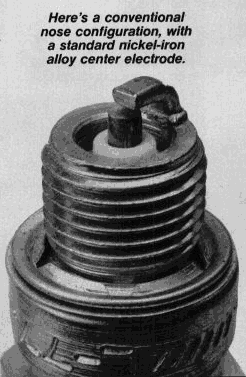Can't find my manual, and I don't remember. What is the proper gap on the standard xs1100?
spark plug gap
Collapse
X
-
Tags: None
-
Clymer
Clymer manual says .028 to .032 with a wire feeler guageXJ1100K
Avon rubber
MikesXS black coils
Iridium plugs w/ 1k caps
MikesXS front master
Paragon SS brake lines (unlinked)
Loud Horns (Stebel/Fiamm)
Progressive fork springs
CIBIE headlight reflector
YICS EliminatorComment
-
plug gaps
If you run hot coils, such as Accel, open 'em up a bit more, like .035-.040.
The more voltage the coil is producing, means the spark can jump a further gap. Bigger the gap and spark, the better igniting of the fuel vapor.2H7 (79) owned since '89
3H3 owned since '06
07 Triumph Tiger 1050
"If it ain't broke, modify it"
☮Comment
-
I thought there is weak spark and good spark. Then there is also pretty good spark. Bike runs cr@py with gaps too close, but if your coils are weak, then it helps.
2H7 (79) owned since '89
Bike runs cr@py with gaps too close, but if your coils are weak, then it helps.
2H7 (79) owned since '89
3H3 owned since '06
07 Triumph Tiger 1050
"If it ain't broke, modify it"
☮Comment
-
Here is my long and short...mostly short
Its not just the spark or the resulting flame but it is the quality of the spark and flame. There is literally tons of reading on this subject. Voltage requirements, spark kernel, baromnetric pressure, heat range, ignition timing, chamber aerodynamics, fuel/air ratio, piston shape, and on and on. Makes you want to think twice about changing your plugs.
In short though it takes heat and pressure to ignite the fuel/air mixture, even in a diesel (in a deisel it is done with high compression). The spark provides this heat and pressure in a gasoline engine and involves everything up the line from the tip of the plug to make it happen optimally.
Opening up the gap on even a stock ignition will give a bigger spark but will put alot of added wear and pressure on the wires, coils, etc. Having a more powerful ignition system is why it is easier to open the gap and still develope a strong spark kernel that is so impotant to lighting off the fuel evenly for the best flame front and fuel burn.
Then there is spark plug design and how much the spark is shrouded (just like the recent thread on unshrouding the valves). Exotic center electrodes and ground strap shapes and designs add to the mix of what kind of spark you get. An exotic and small diameter center electrode will take less electrical energy to produce the spark and thats why platinum plugs are so popular. With a standard type ground strap the spark wants to develop in a cone from the center electrode to the outside edges of the strap providing an unshrouded spark. The U groove type plug makes the spark want to jump to the center of the ground strap thereby making the spark more shrouded and possibly less effective in some motors. Then there are the split point plugs that do what the standard ground strap does but twice.
All these things can make one plug perform great in any given motor and lousey in another. Since I am certainly no electrical/thermal engineer, it boils down to trial and error for me. Now over the years I have tried several types, styles, heat ranges of plugs and I find that I always go back to the NGK BP-6ES (or BP-5ES in Winter) non-resistor plugs that some Japanese engineer obviously ran tons of calculations on. Go figure! Still, this is a very interesting subject.Mike Giroir
79 XS-1100 Special
Once you un-can a can of worms, the only way to re-can them is with a bigger can.Comment
-
Of course, TRBIG is gonna sing again because I posted links...
... and didn't take the time to rewrite this all in my own words.
http://www.dragstuff.com/techarticle...ead-plugs.html
So... there is everything that anybody needs/wants to know about spark plugs.
In my mind, there are three types of "spark plug" people.
People who really don't care about all this...
People like me who buy the correct plug and just put them in...
People like TRBIG who want the best performance out of their bike, though they only use it to ride to Walmart to buy beef jerky and tube socks.
Oh yeah, I forgot about "indexing":
"Damn it Jim, I'm a doctor, not a mechanic!' ('Bones' McCoy)Comment



Comment